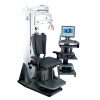
Hire the Right Clinicians To Grow Your Clinic - Five Interview Questions for New Candidates
Practice ManagementFinding the right clinician for your clinic can be a long and daunting process. But getting it right is essential. So here are a few tips to make this experience easier, more efficient, and ultimately – more successful.
As you look to grow your practice, through a combination of adding services, increasing referrals, and patient retention, you may find that your current staffing is not adequate to meet your goals. Simply put – growing your practice may eventually require adding another clinician to your team. Any manager will agree that recruiting and interviewing is difficult. And finding the right clinician who fits into your philosophy and overall long-term goals can be a long and daunting process. But getting it right is essential. So here are a few tips to make this experience easier, more efficient, and ultimately – more successful.
Post specific descriptions online
The last thing you want is to dig through a pile of irrelevant or unqualified resumes. To make sure you only get qualified resumes, make your job posting as specific and informative as possible. It should include just about everything the candidates need to know, to figure out if they’re qualified or not.
Include the license requirements of your institution and/or state, the area of focus the position (hand therapy, sports medicine, burn rehab, industrial rehabilitation, geriatrics, pediatrics, etc.), appropriate years of experience, potential travel requirements, etc.
Some job application sites even let you set up screening questions that each applicant must answer before submitting a resume. Screening questions could ask if the candidate has a specific certification, how many years of experience with a certain condition or population, or any other basic requirement. Keep screening questions limited, and don’t use it in place of an interview.
Ask thought-provoking interview questions
Having a strategic post will save you from interviewing unqualified candidates. Once a candidate gets to the interview stage, you can ask the usual interview questions to get a feel for the candidate’s experience. But if you want to find a truly good fit, you should ask open-ended questions. This will allow the candidates to show how they think and work, how they interact with others, and how they deal with problems. Here are a few questions to get you started:
1. What difficult situation have you encountered at work, and how did you handle it?
This answer should give you insight into the candidates’ conflict resolution skills. You may find out what types of situations the candidates finds difficult, and how they respond to crises. Asking about overcoming adversity gives the candidates the opportunity to tell their ‘hero’ story and share how they can make the best of a situation.
2. Why are you leaving your current position?
This answer could give you a heads up about employee retention. If they are leaving their current position to get out of a displeasing situation, that gives you a hint about what’s important to their work satisfaction. If they’re seeking new experience, you want to make sure you can offer what they’re looking for.
Alternatively, if they talk about personal conflict prompting their departure, remember that every story has multiple sides. True conflict can exist and may be a valid reason for departing a position. This question will open the door to understanding the candidates’ work mindset.
3. Is there a specific patient population or diagnosis you find challenging to work with?
This interview question will probably get one of two response types. They may mention cases they want to avoid if they interpret ‘challenging’ as ‘difficult.’ Or, they may talk about cases that they enjoy if they interpret ‘challenging’ as ‘inspiring’.
If they lean toward the first response, you’ll know what cases they prefer not to work with. If you happen to need someone to work with that condition or population, then that person may not be the best fit. Either way, you can ask for more details to find out specifically what they like and don’t like about certain populations or diagnoses.
4. Ask what they liked (and didn’t like) about their last therapy position
This open-ended interview question lets you listen to what they say as well as how they say it. Pay attention to what they emphasize vs downplay. This also gives you ample opportunity for follow-up questions to really focus in on their clinical experience, therapy approach, attitude and demeanor. These are all important aspects to consider when deciding who will be your new clinician.
5. Fun questions!
Knowing candidates’ professional experience and behavior is important, but don’t forget that they’re human beings! Each candidate that you interview could be someone your team works with every day – for a long time, so you should get a feel for their personality as well. Team dynamic is very important, and you really can’t put a price on that.
Ask about something new they’ve learned, favorite accomplishment, travel destinations, pets, hobbies, etc. These can be good ice-breaker questions to lead with, and help the candidate get comfortable during the interview. Keep in mind that the purpose of these questions is to learn about the candidate, not to pry into their personal life.
In summary
When considering a new therapist for your practice, you must not only assess what the candidate knows, but whether their personality and goals will fit into what you have spent a good part of your career building. They don’t have to agree with everything you believe to be a good fit, but they should understand what you want, and be able to add their skills to help your practice to grow and be a leader in your community.
Taking the time to prepare a thoughtful set of interview questions to guide your recruiting and vetting process is essential. With the right approach, you will find the right talent to help your clinic grow and prosper.




